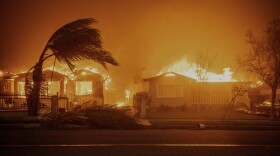JOHN YDSTIE, host:
In Lebanon, the leader of Hezbollah has warned against an all-out attack on militants holed up in refugee camps. Hasan Nasrallah, the head of the Shiite group, said Lebanon risked getting dragged into the U.S. war against al-Qaida. The Hezbollah leader said the crisis could be solved politically rather by the army.
For the second day, U.S. military equipment arrived in Lebanon after a request by the Lebanese government. At least 50 soldiers and militants were killed in heavy fighting there earlier this week. A cease-fire has been in place since Tuesday, but the government has warned that the militants must give up or face a military assault.
NPR's Deborah Amos has been following the story and is in the Lebanese capital Beirut. Deb, is the government any closer to a decision on how to end this crisis?
DEBORAH AMOS: Actually, they are not. And you have to remember that this particular crisis with Fatah el-Islam - those are the militants holed up in the refugee camp - it comes at a time when the government itself is in a paralyzing political crisis and that has divided the country just about right down the middle.
Back in December, Shiite cabinet ministers, allies of Hezbollah, walked out of the government. The parliament no longer meets the remaining government, including the Prime Minister Fouad Siniora who's backed by the U.S. and France. He's barricaded inside government offices. So it's not an ideal atmosphere to resolve a crisis like this.
The defense minister who is part of what Fouad Siniora's government says the militants have to surrender or be eliminated. Then today, you have Hasan Nasrallah, the powerful head of Hezbollah, weighing in saying the army should not take any action inside that camp, not, he said, to defend Fatah Islam, but to preserve the army.
Now, at the moment, the cease-fire is holding. There are negotiators inside the camp, and everybody here hopes that somehow these militants can be talked into making a deal.
YDSTIE: If they can't be persuaded, is the Lebanese army prepared to move on the camp and confront the militants?
AMOS: The army has a very powerful vote in all of this. On the one hand, this army is not used to losing so many people. You know, in the first day of the clashes, the army lost more than 30 soldiers. Some of them had their heads cut off by Fatah el-Islam, who ambushed those soldiers in the early hours of Sunday.
But, on the other hand, the army takes careful political judgment. The army is popular in this country because it's the only institution that's seen to be neutral, as well as reflecting the complex sectarian makeup of this country for - let me give you an example. The head of the army is a Maronite Christian. All the offices below him have to be Sunni Muslims and Shiite Muslims. Then in every brigade, it's mixed Sunni-Christian.
So when the politicians in the country are squabbling, the head of the army, Michel Suleiman, has to think about how to remain neutral.
YDSTIE: U.S. equipment is arriving in the country, reports of body armor and helmets. It appears that the army is gearing up for a showdown.
AMOS: Yes. The Lebanese government says eight planes with U.S. military equipment has arrived. So they're prepared for the showdown. And there's no doubt the army would win. It's a small group of men, who barricaded themselves inside the camp.
But the decision has political implications. There's an agreement that - with Palestinian factions that the Lebanese army does not enter a camp, plus there are civilians there inside that camp. There is a fear here that jihadi(ph) groups might get into the fray if a fight starts.
So all of these things have to be weighed very carefully. And that is what the Lebanese army is doing.
YDSTIE: NPR's Deborah Amos in Lebanon. Thanks very much, Deb.
AMOS: Thank you. Transcript provided by NPR, Copyright NPR.







